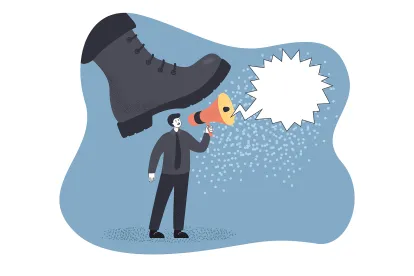The zeitgeist of pandemic-era American politics has been ugly. Really ugly. In an environment where civil disobedience skews uncivil, how do we balance the quintessentially American freedom of speech with the public participation requirements in the Ralph M. Brown Act (“Brown Act.”)? Senate Bill 1100 provides some guidance.
Effective January 1, 2023, SB 1100 clearly authorizes a legislative body (such as a city council or county board of supervisors) to remove disruptive individuals from meetings that, by law, must be made open to the public. The individual must first be given a warning that the disruptive conduct may result in removal from the meeting.[1] If the behavior continues, the individual may then be removed. The bill defines “disruptive” conduct to include behavior that is “disturbing, disrupting, impeding” or behavior that “renders infeasible the orderly conduct of the meeting,” such as use of force, or actual threats of force.[2] This a substantial deviation from historic treatment of the public’s right to participate, which – until recently – legislative bodies have treated as sacrosanct.
Enacted in 1953, the Brown Act was designed to regain public trust in local government decision-making by guaranteeing that the public retained the right to remain informed and to participate in meetings regarding “the people’s business.”[3] In this spirit of transparency and open public discourse, the Brown Act specifically forbids any legislative body from prohibiting “public criticism of the policies, procedures, programs, or services of the agency, or of the acts or omissions of the legislative body.”[4] Although the legislative body has express rights to limit speaking times and to create laws governing conduct in their meetings, there were few clearly-articulated limits on the public’s freedom of expression. In theory, this broad protection for public speech is a good thing. In practice, this means that some state and local officials avoid intervening during public comment for fear of overstepping the public’s statutory right to speak – even in situations where the meeting is derailed by disruptive individuals.
However, over the past few years, nearly every platform for public discourse has grown more hostile. Reports of increasingly outrageous and, at times, dangerous behavior during public meetings have become almost normalized in the context of pandemic-era American politics. For example, in early 2020, a protestor was charged with several felonies after allegedly throwing human blood at California state senators.[5] Elected officials throughout the country have reported being harassed by protestors outside of their homes, in addition to during public meetings or at their public offices.
It is well established that “public office is no place for the thin-skinned;”[6] but there must be a line. And that line should be drawn before disruption devolves into criminal behavior. Will SB 1100 provide enough clarity on what is “disruptive” to empower state and local officials to remove a few bad apples in the interest of genuine public discourse? Only time will tell.
FOOTNOTES
[1] Govt. Code § 54957.95.
[2] Id.
[3] Govt. Code § 54950.
[4] Govt. Code § 54954.3(c).
[6] Pittsburg Unified School Dist. v. California School Employees Ass’n (1985) 166 Cal.App.3d 875, 899.



 />i
/>i
